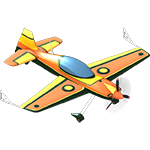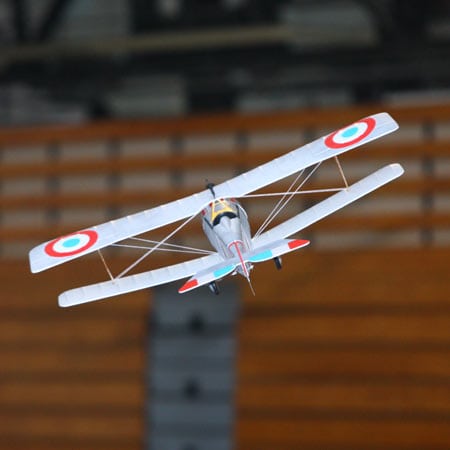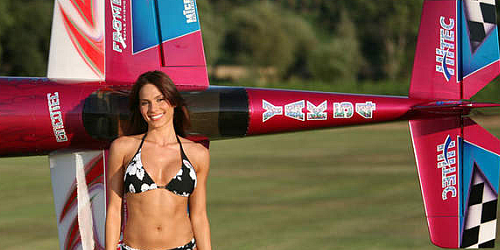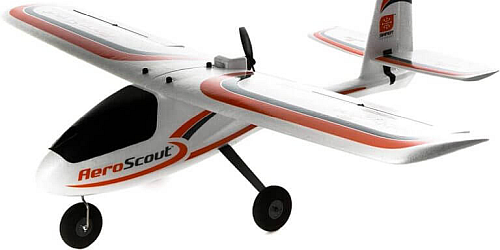A common concern people once had about RC planes was the need for ample space to operate them. However, this issue has been effectively resolved with the advent of indoor RC planes.
Remote-controlled aircraft models captivate enthusiasts not only with their realistic appearance but also with their ability to fly. The size of these models can vary, but historically, the scale has set limits on how small a plane could be. A functional model needed to accommodate an engine, receiver, and batteries in the case of electric aircraft. As a result, these planes required ample space for takeoff, landing, and flying.
One solution to this spatial challenge was the introduction of remote-controlled helicopters. Requiring less space for takeoff and landing, helicopters could operate in more confined areas. This breakthrough allowed hobbyists to enjoy flying their remote-controlled helicopters indoors, in large spaces like workshops or gyms. This versatility made it possible to pursue the hobby year-round, as enthusiasts could move indoors during inclement weather. However, despite their unique appeal, helicopters couldn’t entirely replace the thrill of flying traditional remote-controlled airplanes.
[iframe width=”900″ src=”https://www.youtube.com/embed/0CExezydc8Q” frameborder=”0″ allow=”accelerometer; autoplay; clipboard-write; encrypted-media; gyroscope; picture-in-picture” allowfullscreen]
The ability to produce miniature components ushered in the era of flying indoor remote control. The receiver was an important issue, but the advent of computer chips allowed small and light receptors. Now could fly airplanes remote control inside buildings along with helicopters. Indoor flight clubs began to open and quickly grew in popularity. Almost every building with an open space was now a potential area of flight.
Remote Micro flyers power Indoor Electric scale model aircraft is an example of the kind. It is a mere 8.2 inches in length with a Wingspan 9 inch. The battery pack allows small to fly up to six minutes on a single charge. The controller operates on 6 AA batteries. Aeroplanes indoor remote control as the flyers Micro can also be used outdoors. It is much more vulnerable to high wind due to their lightweight but can run outdoors in calm weather just as well as indoors.
The final expression of the indoor RC airplanes can Plantraco 3.6 g butterfly. This level has a Miniature 0.4 gram Micro900 and downloads a box 5: 1 GB05 4 mm. This tiny and light aircraft needs a simple room at least 12 feet by 12 feet to operate; This is approximately the size of a nice-sized living room; very small and medium-sized remote control games were part of the mania for some time with cars used for tabletop and indoor racing pioneer. Now it is possible to fly airplanes remote control in your living room – the indoor RC scale model aircraft.
How to Choose the Right Indoor Model Airplane for You
RFT vs. scratch-built RC model airplanes
Until quite recently, someone taking up the challenge of flying a practical indoor RC model plane was a special modeler indeed. The electronic control equipment for RC planes was designed for outdoor gas-powered models, and the electronic components were not small or lightweight enough for micro flight.
Electric-powered model plane plan designs existed, but they flew outdoors and were forced to use weighty NiCad or NiMH rechargeable batteries to power the brushed electric motors of the day. Technology did not permit the manufacture of the miniature equipment items needed for practical smaller RC model airplanes.
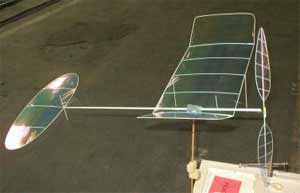
Early micro-model airplanes
Indoor model airplane flying did exist since the earliest times. Some of the first model airplane flights took place at the beginning of the 20th century using rubber band-powered free flight models. It was every modeler’s dream to have some way to remotely guide these models from the ground.
But to achieve this goal, modelers were entirely dependent on technology to make the micro-sized electronic components that could make inside RC flight a reality.
These tasks included producing tiny servos to move the control surfaces, adapting some sort of electronic speed control for a proportional throttle function, and developing very small rechargeable batteries. In addition, there is a critical requirement for producing micro-sized models to incorporate all these emerging technologies into a practical flight package.
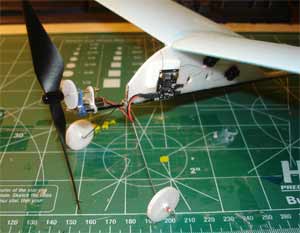
In light of these challenges to keep things small and lightweight, it turns out that today the best choice for a beginning smaller RC model airplane is to use a ready-to-fly (RTF) aircraft. Again, this is a recent development of the hobby. Ready-to-fly aircraft started becoming popular and widely available for gas and electric-powered outdoor models around the year 2000. Today, it can be a challenge to simply find a kit for an RC model aircraft, as the vast majority of model planes these days are offered in a ready-to-fly package.
The Finch does a great first-build project for a simple RC flyer. You can download a free set of full-size plans for the Finch. The Pietenpol Air Camper is a superb second aircraft for newcomers to RC flight.
Luckily, innovative manufacturers have perfected the micro ready-to-fly model airplane for both beginning and advanced pilots. These remarkable models come literally ready to fly right out of the box and can include the transmitter, lightweight rechargeable battery, airplane, and all electronics installed. All the tyro RC pilot needs to do is charge the supplied battery and head into the air.
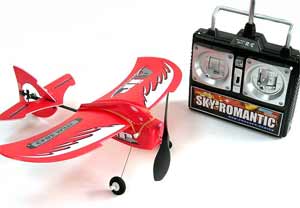
Ready to Fly electric RC airplanes
The advent of truly well-built RTF micro electric RC models and remote control helicopters that are good flyers is remarkable. Due to the nature of the small size and demanding weight and construction requirements for these tiny aircraft, it requires advanced modeling skills to construct a beginning smaller RC model airplane. There is an essentially insurmountable barrier to the beginning RC pilot in that they did not possess the specialized building skills required to construct a practical micro flyer.
Happily, this problem is completely solved today. Affordable aircraft such as the ParkZone Ember and Cessna 210 are available to modelers everyone. These remarkable RC aircraft truly fly well.
The Ember, in particular, is one of the best-handling model airplanes I have flown in over 37 years in the RC hobby. You can actually teach yourself how to fly RC models with these noteworthy airplanes. Flying RC planes inside, there is no wind to worry about. The RTF foam aircraft fly slowly enough for you to see your control inputs easily. The inevitable bumps and crashes do not cause any lasting damage to these light, resilient aircraft.
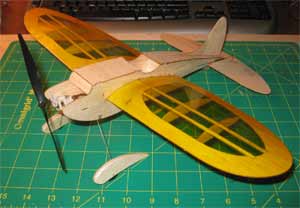
Kits for smaller RC model airplanes
After you gain flying proficiency with one or two RTF micro airplanes, you can explore building one yourself. You can reuse the radio control equipment from the RTF airplane for the one you are building.
You will have to purchase a scale to weigh your model airplane building materials to ensure your finished airplane comes in at an acceptable weight. Even an extra dab of glue can make the difference between a well-performing micro model and one that cannot maintain level flight.

